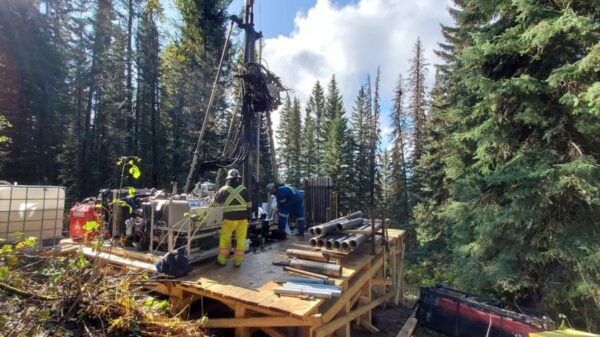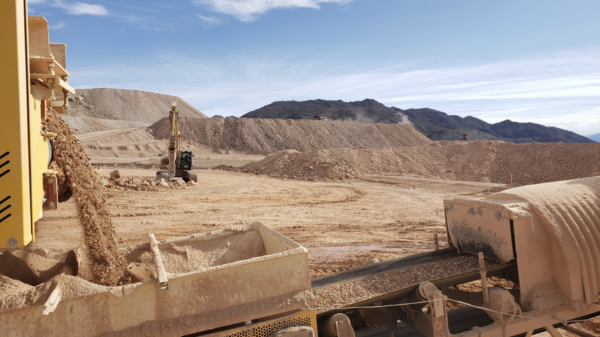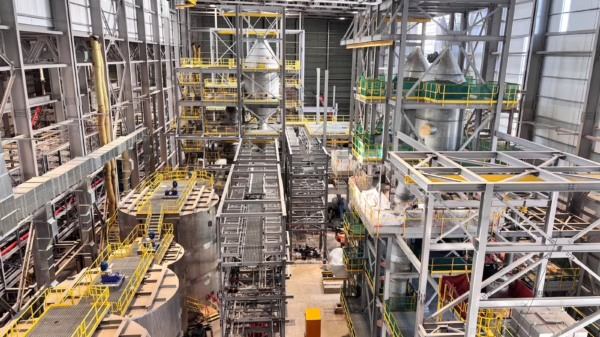Pure Energy Minerals (TSXV: PE) and oilfield services company SLB (NYSE: SLB) have agreed to work together to develop the scale lithium claims at Pure Energy’s Clayton Valley lithium project in Nevada.
The company said on Wednesday that it had received the final government permits for the construction and operation of the demonstration plant. Additionally, it has completed plant constructed and started technical trials.
The company is developing the 9,450 hectare Clayton Valley project, which is the largest mineral land holding in the area. It’s adjoined and surrounded on three sides by Albemarle Corporation‘s (NYSE: ALB) Silver Peak lithium brine mine.
SLB has deployed a demonstration plant onsite to test an integrated approach that combines subsurface expertise and surface engineering of advanced technologies, including direct lithium extraction (DLE), at the project in Esmeralda County.
“SLB’s demonstration plant represents a significant step toward sustainable lithium brine production at scale,” Joseph Mullin, Pure Energy Minerals CEO, said.
“The ongoing technical trials at the facility give us increased confidence that SLB’s integrated approach is the future for lithium brine extraction in Clayton Valley and elsewhere.”
The plant is located five kilometers southeast of the town of Silver Peak on Bureau of Land Management (BLM) lands. Pure Energy holds 950 BLM mineral claims in the Clayton Valley area.
The project has already received all the necessary permits from both the State of Nevada and the Nevada Division of Water Resources for the demonstration plant construction and water discharge in 2022 and 2023. Consequently, construction was mostly complete by Q3 of last year.
Read more: Lithium South Development expands production goals, updates PEA on Hombre Muerto lithium project
Read more: Lithium South Development updates leadership roster, appoints new director
United States faces lithium supply problems
The United States faces challenges in securing a stable and sufficient supply of lithium.
Despite increasing demand, domestic production remains limited, with most of the country’s lithium supply historically reliant on imports. This dependence poses a strategic vulnerability, particularly as global competition for lithium intensifies.
Projects like those in Nevada’s Clayton Valley and the Thacker Pass, led by companies such as Albemarle and Lithium Americas Corp. (TSX: LAC) (NYSE: LAC), are necessary for domestic production. However, the U.S. must navigate environmental concerns, regulatory hurdles, and the need for substantial investment in mining and processing infrastructure to establish a more self-sufficient and resilient lithium supply chain.
The Salton Sea in California and recent discoveries in Pennsylvania represent significant boosts to the United States’ lithium reserves. The geothermal brine under the Salton Sea is estimated to contain vast quantities of lithium, presenting a promising opportunity for sustainable extraction.
Companies like Controlled Thermal Resources are using new methods to extract lithium from these brines, potentially transforming the region into a major lithium production hub. Additionally, recent findings involving lithium-rich waste water leftover from hydraulic fracturing in Pennsylvania have unveiled lithium options, further enhancing the domestic supply potential. These discoveries could play a role in the future in reducing the U.S.’s reliance on imported lithium.
But those developments are still years away and the Clayton Valley isn’t nearly enough to fulfill all of the U.S.’s lithium requirements.
Read more: Lithium South Development technical report shows 40% increase in lithium recovery
Read more: Lithium South Development first production well installed at Hombre Muerto lithium project
Inflation Reduction Act offers tax incentives for lithium production
As a result, President Joe Biden added incentives inside the U.S. Inflation Reduction Act (IRA) to facilitate global supply chains for critical minerals. The IRA primarily benefits United States-based companies but also extends advantages to companies from friendly countries with which the U.S. has a free trade agreement.
These benefits include tax credits, grants, and loan guarantees aimed at encouraging investment and development in critical mineral projects.
In the ensuing months following the introduction of the bill, Biden met with world leaders President Gabriel Boric of Chile, and President Javier Milei of Argentina to discuss the benefits U.S.-based companies could expect.
President Gabriel Boric’s administration aims to attract foreign capital to leverage Chile’s vast lithium reserves and advance further in the battery supply chain as the clean energy transition accelerates. Chile’s free-trade agreement with the United States makes that much easier. President Milei’s country, however, does not presently have a free trade agreement with the United States.
Instead, the United States and Argentina have a bilateral investment treaty, facilitating investments from over 500 U.S. companies totalling nearly USD$20 billion as of 2013. U.S. direct investment in Argentina focuses primarily on industry, agriculture, natural resources, finance, and services sectors. That isn’t enough.
That means little to lithium giants like Albemarle and Arcadium Lithium plc (NYSE: ALTM) (ASX: LTM), with operations spanning multiple jurisdictions including Argentina, will receive full benefits from the IRA. However, small-scale and small-cap lithium companies such as Lithium South Development Corporation (TSXV: LIS) (OTCQB: LISMF) (Frankfurt: OGPQ) could find significant missed opportunities.
.
Lithium South Development Corporation is a sponsor of Mugglehead news coverage
.
Follow Joseph Morton on Twitter
joseph@mugglehead.com














